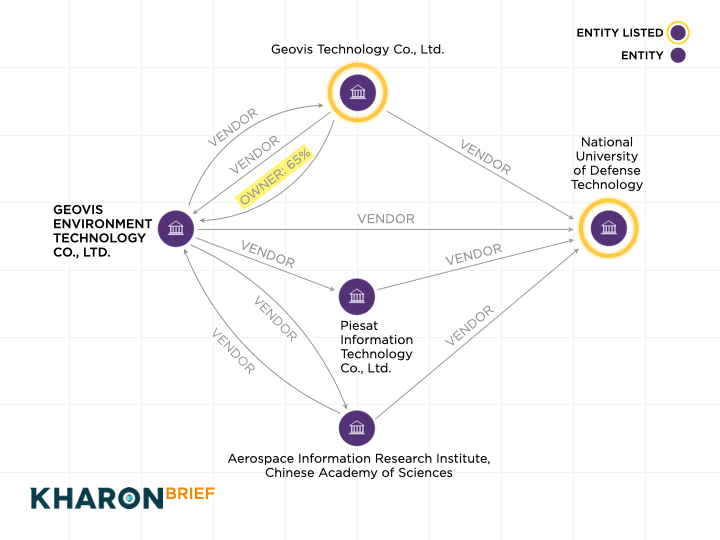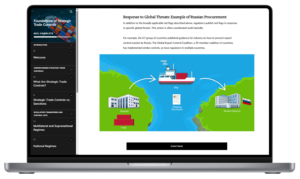The BIS 50% Rule
Closing a Gap in Our Export Control Defenses
📅 October 2, 2025
📅 October 2, 2025
On Monday September 29, 2025, the U.S. Commerce Department’s Bureau of Industry and Security (BIS) published an interim final rule for “Non-listed Affiliates of listed entities.” The rule establishes that any entity that is at least 50% owned by an entity on the BIS Entity List, BIS Military End User (MEU) List, or a specified subset of parties on the OFAC Specially Designated Nationals and Blocked Persons list (SDN List), is automatically subject to same restrictions as the parent.
Until now, export control requirements applied only to entities specifically named on the BIS Entity List and MEU Lists. They did not apply to subsidiaries of listed entities, unless they were specifically named on a List.
The effect was to create a loophole which allowed listed entities to use their subsidiaries to acquire restricted goods, software, and technology. When an Entity was added to the BIS Lists – and therefore became subject to restrictions – it could set up a majority or wholly-owned subsidiary and continue to acquire restricted items. This unlawful diversion could continue during the time required for BIS to assess and add the subsidiaries to the BIS Lists.
What are the BIS Entity List and MEU Lists?
The Entity List is a list of parties (including individuals, businesses, and government organizations) identified by BIS as subject to export licensing restrictions, due to the risk of unlawful diversion.
The Military End User List identifies foreign parties who are military end users, meaning a license is required to export, re-export, or transfer items to them, even if a license would not usually be required for that item.
In February 2023, a Chinese high-altitude balloon flew over sensitive U.S. locations, before being intercepted and shot down. After assessment of the companies behind the program, the U.S. added Geovis Technology Co., Ltd to the BIS Entity List in May 2024. The diagram below shows some of the companies related to Geovis Technology.

Source: Kharon (January 2025)
As shown in the diagram, one of Geovis Technology’s majority-owned subsidiaries (65% shareholding) is Geovis Environment Technology. According to analysis by a global risk analytics provider, Geovis Environment Technology has sold services including data analysis and processing systems to BIS-Listed entities including its parent (listed since 2024), and the National University of Defense Technology [of China] (listed since 2015). Geovis Environment Technology has also sold services to two additional suppliers to the National University of Defense Technology.
At the date of this article, Geovis Environment Technology has not been added to the BIS Entity List and would not previously have been subject to export restrictions, despite being a majority-owned subsidiary of a listed entity. Under the BIS Affiliates Rule, it will also be considered subject to the same restrictions as its listed parent entity.
If a foreign entity is a majority-owned or wholly-owned subsidiary of an entity on the BIS Entity List, BIS MEU List, or the specified subset of the OFAC SDN List, it is subject to the same restrictions as the parent entity.
The Affiliates rule is modeled on the OFAC 50% Rule: the BIS statement states that it is “designed to be consistent with longstanding Department of the Treasury practice.”
There are common elements between the BIS and OFAC Rules:
A “significant minority ownership” by listed entities (BIS or OFAC), or leadership links to listed entities, are also a “red flag of diversion risk” and require additional due diligence.
In contrast with many types of economic sanctions, being subject to export control licensing requirements does not bar all activity with the entity. Instead, a more nuanced analysis is required which includes the end use, end user, licenses required, and licenses held.
Following the New Guidance to Financial Institutions, published by BIS in October 2024, financial institutions should already have incorporated export controls into their counter illicit finance programs. The scope of the guidance and potential actions for banks are described here.
In response to the BIS Affiliates Rule, financial institutions would be well-advised to re-confirm and, where required, adapt their existing controls to ensure the requirements are met:
The BIS Affiliates Rule closes a loophole that facilitated unlawful diversion of sensitive and restricted components to western adversaries. By closing it, better protection is provided for these items, and export controls are moved into closer alignment with sanctions.
UPDATE: Please note, implementation of the BIS 50% Rule has been suspended for one year, starting on November 10, 2025.

Our course Foundations of Strategic Trade Controls offers a comprehensive overview of how to understand and apply strategic trade control requirements, with a particular focus on those applicable to financial institutions.
Learn more and strengthen your compliance skills today.










 Operation Mouse
Operation MouseThis site uses cookies. By continuing to browse the site, you are agreeing to our use of cookies.
Accept settingsHide notification onlySettingsWe may request cookies to be set on your device. We use cookies to let us know when you visit our websites, how you interact with us, to enrich your user experience, and to customize your relationship with our website.
Click on the different category headings to find out more. You can also change some of your preferences. Note that blocking some types of cookies may impact your experience on our websites and the services we are able to offer.
These cookies are strictly necessary to provide you with services available through our website and to use some of its features.
Because these cookies are strictly necessary to deliver the website, refusing them will have impact how our site functions. You always can block or delete cookies by changing your browser settings and force blocking all cookies on this website. But this will always prompt you to accept/refuse cookies when revisiting our site.
We fully respect if you want to refuse cookies but to avoid asking you again and again kindly allow us to store a cookie for that. You are free to opt out any time or opt in for other cookies to get a better experience. If you refuse cookies we will remove all set cookies in our domain.
We provide you with a list of stored cookies on your computer in our domain so you can check what we stored. Due to security reasons we are not able to show or modify cookies from other domains. You can check these in your browser security settings.
These cookies collect information that is used either in aggregate form to help us understand how our website is being used or how effective our marketing campaigns are, or to help us customize our website and application for you in order to enhance your experience.
If you do not want that we track your visit to our site you can disable tracking in your browser here:
We also use different external services like Google Webfonts, Google Maps, and external Video providers. Since these providers may collect personal data like your IP address we allow you to block them here. Please be aware that this might heavily reduce the functionality and appearance of our site. Changes will take effect once you reload the page.
Google Webfont Settings:
Google Map Settings:
Google reCaptcha Settings:
Vimeo and Youtube video embeds:
You can read about our cookies and privacy settings in detail on our Privacy Policy Page.
Privacy Policy